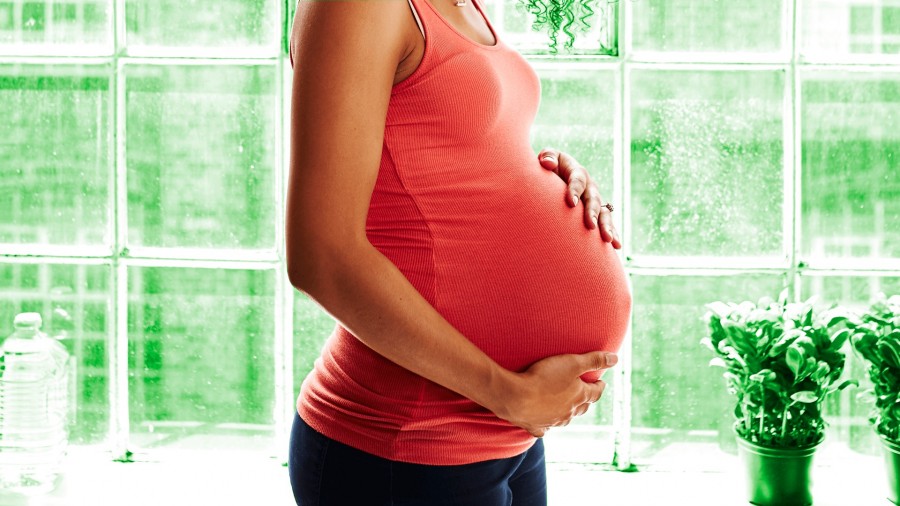Healthy diet while pregnant
Eat Healthy During Pregnancy: Quick tips - MyHealthfinder
Pregnancy
When you are pregnant, you need more of certain nutrients like protein, iron, folic acid, and iodine. It’s also important to get enough calcium.
Making smart food choices can help you have a healthy pregnancy and a healthy baby. Here are some ideas to help you eat healthy during pregnancy.
Follow a healthy eating pattern.
Eating healthy means following a healthy eating pattern that includes a variety of nutritious foods and drinks.
- Eat a variety of vegetables, fruits, whole grains, fat-free or low-fat dairy products, and protein foods.
- Choose foods and drinks with less added sugars, saturated fats, and sodium (salt).
- Limit refined grains and starches, which are in foods like cookies, white bread, and some snack foods.
- If you are feeling sick, try eating a piece of whole-grain toast or whole-grain crackers.
Learn more about eating healthy.
Get the right amount of calories for you.
Being pregnant doesn't mean you need to eat twice as much food.
- First trimester (first 12 weeks) – Most women don’t need any extra calories.
- Second trimester (13 to 26 weeks) – Most women need about 340 extra calories a day.
- Last trimester (after 26 weeks) – Most women need about 450 extra calories a day.
Ask your doctor or midwife how many calories you need during pregnancy.
Create a personalized Daily Food Plan.
Make healthy snack choices.
Examples of healthy snacks include:
- Low-fat or fat-free yogurt with fruit (look for options with no added sugar)
- Whole-grain crackers with fat-free or low-fat cheese
- Carrots with hummus
Take a prenatal vitamin with folic acid, iron, and iodine every day.
- Folic acid helps prevent some birth defects of the brain and spine.
- Iron and iodine help keep you and your baby healthy.

Talk with your doctor or nurse about a prenatal vitamin that’s right for you.
Eat 8 to 12 ounces of seafood each week.
Fish and shellfish have healthy fats that are good for you and your baby. But some fish is high in mercury, a metal that can hurt your baby’s development. It’s a good idea to eat seafood that is high in healthy fats but lower in mercury.
Best choices
These choices are lower in mercury, so you can eat 8 to 12 ounces a week.
- Canned light tuna
- Catfish
- Cod
- Herring
- Oysters
- Salmon
- Shad
- Shrimp
- Tilapia
- Trout
Good choices
You can eat 4 ounces of these fish a week if you don’t eat any other seafood that week.
- Canned or fresh white (albacore) tuna
- Chilean sea bass or striped bass
- Grouper
- Halibut
- Mahi-mahi
- Snapper
- Yellowfin tuna
Fish to avoid
Don’t eat bigeye tuna, king mackerel, marlin, orange roughy, shark, swordfish, or tilefish. They are high in mercury.
They are high in mercury.
Learn more about choosing fish that is healthy and safe to eat [PDF - 308 KB].
Don’t eat certain foods.
These foods may have bacteria in them that can hurt your baby. Stay away from:
- Raw (uncooked) or rare (undercooked) fish or shellfish, like sushi or raw oysters
- Soft cheeses (like feta, Brie, and goat cheese), unless they are pasteurized
- Raw or rare meats, poultry, or eggs
- Unpasteurized juices or milk
- Lunch or deli meats, smoked seafood, and hot dogs – unless they are heated until steaming hot
- Prepared salads like ham salad, chicken salad, or seafood salad
- Raw sprouts, including alfalfa, clover, radish, and mung bean sprouts
Learn more about foods to avoid during pregnancy.
Limit drinks with caffeine and added sugars.
- If you drink coffee or tea, choose decaf. Pick unsweetened options and don’t add sugar.
- Drink water or seltzer instead of drinks with added sugars like soda, fruit drinks, and energy or sports drinks.
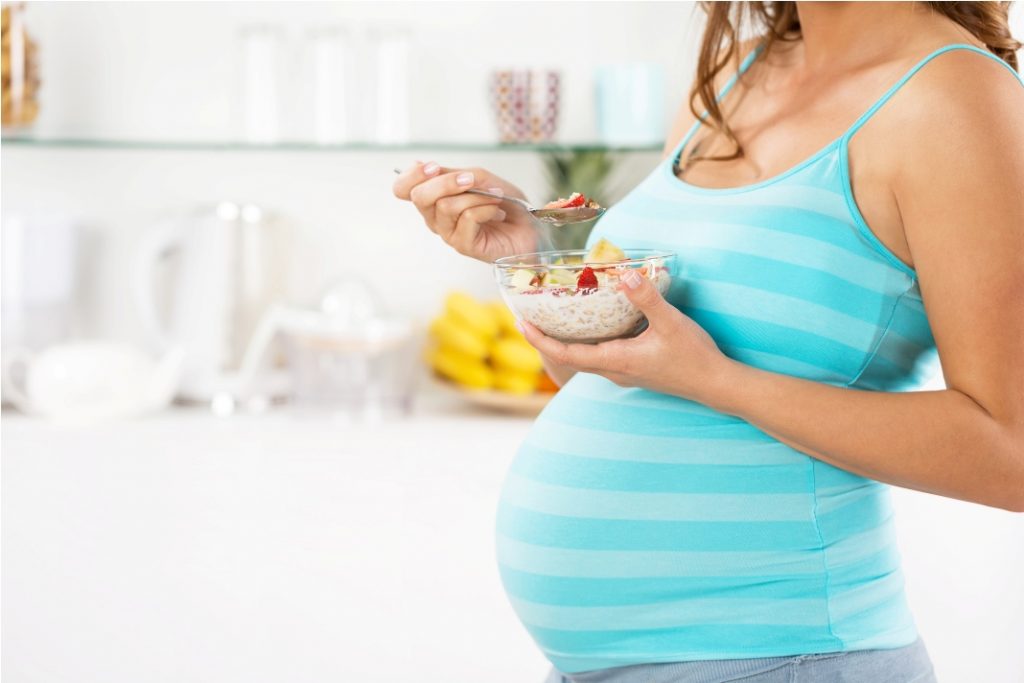
Don’t drink alcohol.
No amount of alcohol is safe during pregnancy.
Content last updated June 1, 2022
Reviewer Information
This information on healthy eating during pregnancy was adapted from materials from the U.S. Department of Agriculture, the Office on Women’s Health, and the National Institutes of Health Weight-control Information Network (WIN).
Reviewed by:
The U.S. Department of Health and Human Services and the U.S. Department of Agriculture Dietary Guidance Review Committee
For more information on healthy eating during pregnancy, visit:
- http://www.choosemyplate.gov/moms-pregnancy-breastfeeding
- https://www.womenshealth.gov/pregnancy/youre-pregnant-now-what/staying-healthy-and-safe
Pregnancy Diet: 13 Foods to Eat While Pregnant
Pregnant? Hangry? Looking for a snack that will make your tummy and your baby happy? You’re probably hearing it a lot: Eating nutritious foods while pregnant is essential.
We’re here to make your pantry into a one-stop shop of healthy and delicious foods that will give your baby the best start to life.
When building your healthy eating plan, you’ll want to focus on whole foods that give you higher amounts of the good stuff you’d need when not pregnant such as:
- protein
- vitamins and minerals
- healthy types of fat
- complex carbohydrates
- fiber and fluids
Here are 13 super nutritious foods to eat when you’re pregnant to help make sure you’re hitting those nutrient goals.
During pregnancy, you need to consume extra protein and calcium to meet the needs of your growing little one. Dairy products like milk, cheese, and yogurt should be on the docket.
Dairy products contain two types of high-quality protein: casein and whey. Dairy is the best dietary source of calcium, and provides high amounts of phosphorus, B vitamins, magnesium, and zinc.
Yogurt, especially Greek yogurt, contains more calcium than most other dairy products and is especially beneficial. Some varieties also contain probiotic bacteria, which support digestive health.
Some varieties also contain probiotic bacteria, which support digestive health.
If you’re lactose intolerant, you may also be able to tolerate yogurt, especially probiotic yogurt. Check with your doctor to see if you can test it out. A whole world of yogurt smoothies, parfaits, and lassi could be waiting.
This group of food includes lentils, peas, beans, chickpeas, soybeans, and peanuts (aka all kinds of fabulous recipe ingredients!).
Legumes are great plant-based sources of fiber, protein, iron, folate, and calcium — all of which your body needs more of during pregnancy.
Folate is one of the most essential B vitamins (B9). It’s very important for you and baby, especially during the first trimester, and even before.
You’ll need at least 600 micrograms (mcg) of folate every day, which can be a challenge to achieve with foods alone. But adding in legumes can help get you there along with supplementation based on your doctor’s recommendation.
Legumes are generally very high in fiber, too. Some varieties are also high in iron, magnesium, and potassium. Consider adding legumes to your diet with meals like hummus on whole grain toast, black beans in a taco salad, or a lentil curry.
Some varieties are also high in iron, magnesium, and potassium. Consider adding legumes to your diet with meals like hummus on whole grain toast, black beans in a taco salad, or a lentil curry.
Sweet potatoes are not only delicious cooked about a thousand ways, they’re also rich in beta carotene, a plant compound that is converted into vitamin A in your body.
Vitamin A is essential for baby’s development. Just watch out for excessive amounts of animal-based sources of vitamin A, such as organ meats, which can cause toxicity in high amounts.
Thankfully, sweet potatoes are an ample plant-based source of beta carotene and fiber. Fiber keeps you full longer, reduces blood sugar spikes, and improves digestive health (which can really help if that pregnancy constipation hits).
For a fab brekky, try sweet potatoes as a base for your morning avocado toast.
Smoked on a whole wheat bagel, teriyaki grilled, or slathered in pesto, salmon is a welcome addition to this list.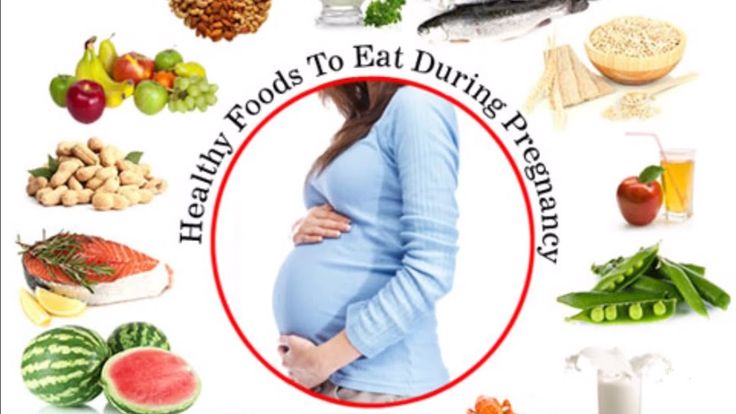 Salmon is rich in essential omega-3 fatty acids that have a host of benefits.
Salmon is rich in essential omega-3 fatty acids that have a host of benefits.
These are found in high amounts in seafood, and help build the brain and eyes of your baby and can even help increase gestational length.
But wait: Have you been told to limit your seafood intake due to the mercury and other contaminants found in high mercury fish? You can still eat fatty fish like salmon.
Here are the high mercury fish to avoid:
- swordfish
- shark
- king mackerel
- marlin
- bigeye tuna
- tilefish from the Gulf of Mexico
Plus, salmon is one of the very few natural sources of vitamin D, which is lacking for most of us. It’s important for bone health and immune function.
Those incredible, edible eggs are the ultimate health food, as they contain a little bit of almost every nutrient you need. A large egg contains about 80 calories, high-quality protein, fat, and many vitamins and minerals.
Eggs are a great source of choline, a vital nutrient during pregnancy.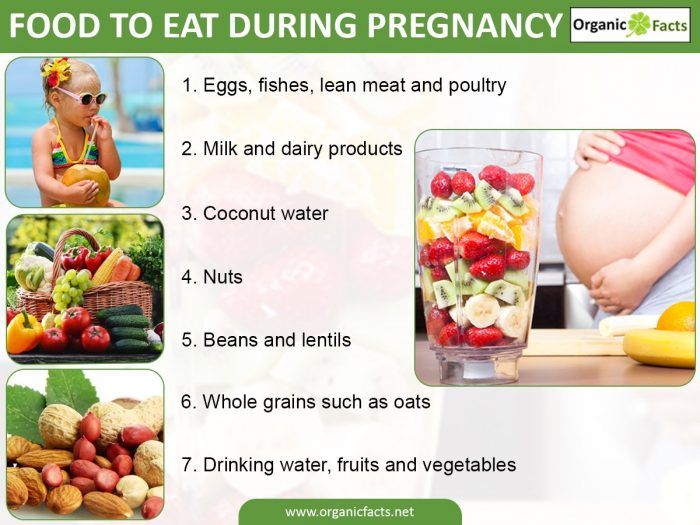 It’s important in baby’s brain development and helps prevent developmental abnormalities of the brain and spine.
It’s important in baby’s brain development and helps prevent developmental abnormalities of the brain and spine.
A single whole egg contains roughly 147 milligrams (mg) of choline, which will get you closer to the current recommended choline intake of 450 mg per day while pregnant (though more studies are being done to determine if that is enough).
Here are some of the healthiest ways to cook eggs. Try them in spinach feta wraps or a chickpea scramble.
No surprise here: Broccoli and dark, green vegetables, such as kale and spinach, pack in so many of the nutrients you’ll need. Even if you don’t love eating them, they can often be squirreled into all kinds of dishes.
Benefits include fiber, vitamin C, vitamin K, vitamin A, calcium, iron, folate, and potassium. They’re a bonanza of green goodness.
Adding in servings of green veggies is an efficient way to pack in vitamins and fend off constipation due to all that fiber. Vegetables have also been linked to a reduced risk of low birth weight.
Try this kale eggs Florentine recipe or blend some spinach into a green smoothie and you won’t even know it’s in there.
Lean beef, pork, and chicken are excellent sources of high-quality protein. Beef and pork are also rich in iron, choline, and other B vitamins — all of which you’ll need in higher amounts during pregnancy.
Iron is an essential mineral that is used by red blood cells as a part of hemoglobin. You’ll need more iron since your blood volume is increasing. This is particularly important during your third trimester.
Low levels of iron during early and mid-pregnancy may cause iron deficiency anemia, which increases the risk of low birth weight and other complications.
It can be hard to cover your iron needs with meals alone, especially if you develop an aversion to meat or are vegetarian or vegan. However, for those who can, eating lean red meat regularly may help increase the amount of iron you’re getting from food.
Pro tip: Pairing foods that are rich in vitamin C, such as oranges or bell peppers, along with iron-rich foods may also help increase absorption.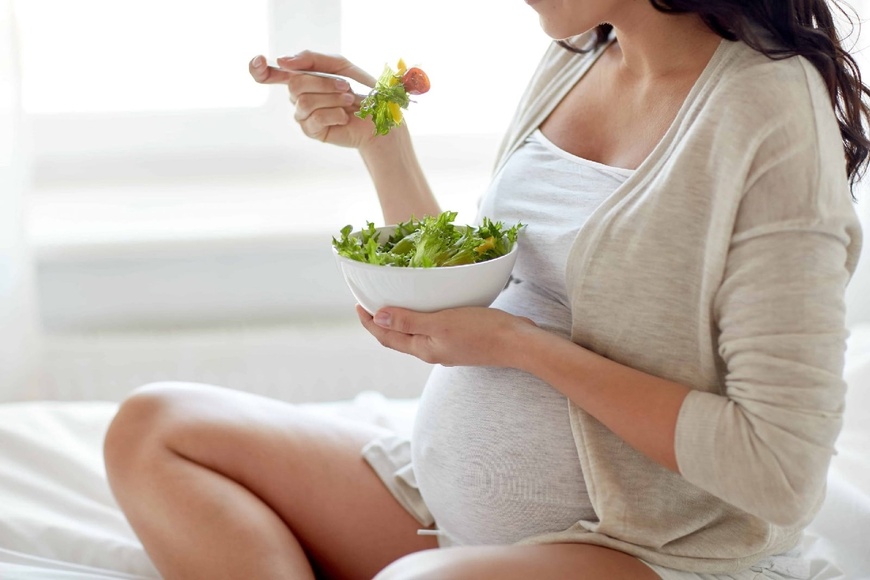
Toss some vitamin C-rich tomato slices on that turkey burger or whip up this steak and mango salad.
Berries hold a lot of goodness in their tiny packages like water, healthy carbs, vitamin C, fiber, and antioxidants.
Berries have a relatively low glycemic index value, so they should not cause major spikes in blood sugar.
Berries are also a great snack, as they contain both water and fiber. They provide a lot of flavor and nutrition, but with relatively few calories.
Some of the best berries to eat while pregnant are blueberries, raspberries, goji berries, strawberries, and acai berries. Check out this blueberry smoothie for some inspiration.
Unlike their refined counterparts, whole grains are packed with fiber, vitamins, and plant compounds. Think oats, quinoa, brown rice, wheat berries, and barley instead of white bread, pasta, and white rice.
Some whole grains, like oats and quinoa, also contain a fair amount of protein. They also hit a few buttons that are often lacking in pregnant people: B vitamins, fiber, and magnesium.
There are so many ways to adds whole grains to any meal, but we’re especially liking this quinoa and roasted sweet potato bowl.
Avocados are an unusual fruit because they contain a lot of monounsaturated fatty acids. This makes them taste buttery and rich — perfect for adding depth and creaminess to a dish.
They’re also high in fiber, B vitamins (especially folate), vitamin K, potassium, copper, vitamin E, and vitamin C.
Because of their high content of healthy fats, folate, and potassium, avocados are a great choice during pregnancy (and always).
The healthy fats help build the skin, brain, and tissues of your little one, and folate may help prevent neural tube defects, developmental abnormalities of the brain and spine such as spina bifida.
Potassium may help relieve leg cramps, a side effect of pregnancy for some women. In fact, avocados contain more potassium than bananas.
Try them as guacamole, in salads, in smoothies, and on whole wheat toast, but also as a substitute for mayo or sour cream.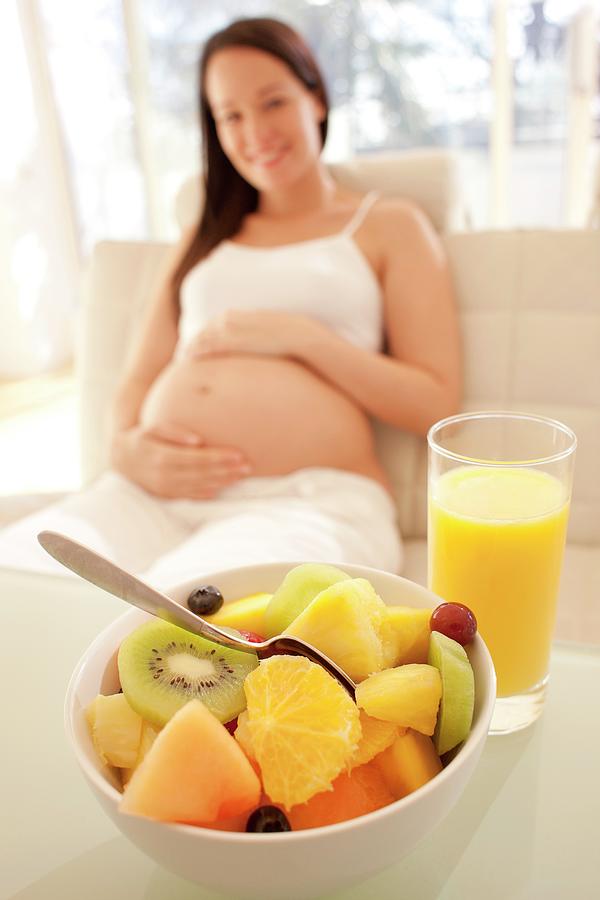
Dried fruit is generally high in calories, fiber, and various vitamins and minerals. One piece of dried fruit contains the same amount of nutrients as fresh fruit, just without all the water and in a much smaller form.
One serving of dried fruit can provide a large percentage of the recommended intake of many vitamins and minerals, including folate, iron, and potassium.
Prunes are rich in fiber, potassium, and vitamin K. They’re natural laxatives and may be very helpful in relieving constipation. Dates are high in fiber, potassium, iron, and plant compounds.
However, dried fruit also contains high amounts of natural sugar. Make sure to avoid the candied varieties, which contain even more sugar.
Although dried fruit may help increase calorie and nutrient intake, it’s generally not recommended to consume more than one serving at a time.
Try adding a small portion to a trail mix with nuts and seeds for an on-the-go protein- and fiber-filled snack.
Fish liver oil is made from the oily liver of fish, most often cod.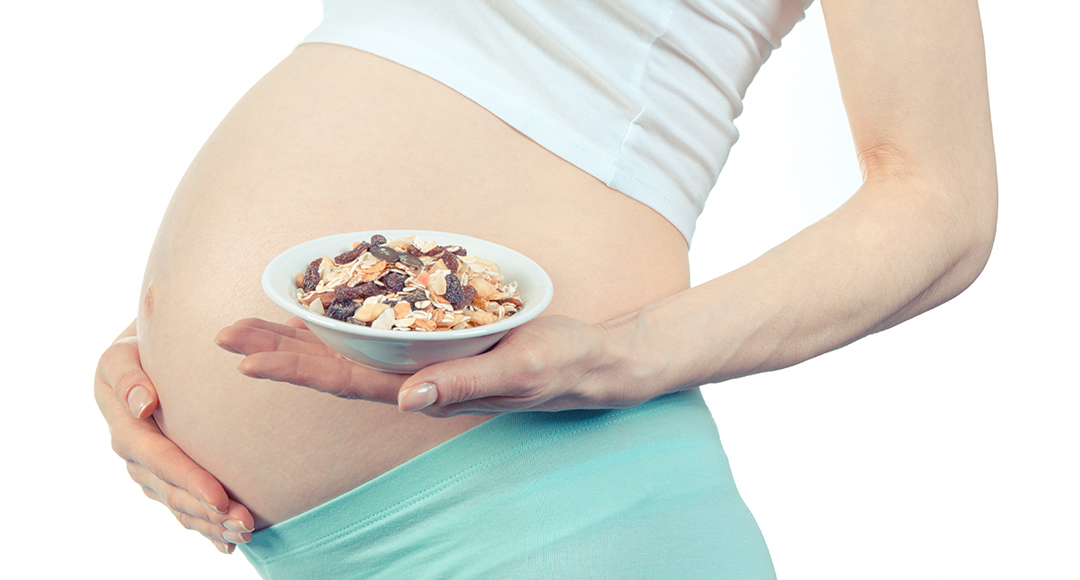 It’s rich in the omega-3 fatty acids EPA and DHA, which are essential for fetal brain and eye development.
It’s rich in the omega-3 fatty acids EPA and DHA, which are essential for fetal brain and eye development.
Supplementing with fish oil may help protect against preterm delivery and may benefit fetal eye development.
Fish liver oil is also very high in vitamin D, of which many people don’t get enough. It may be highly beneficial for those who don’t regularly eat seafood or supplement with omega-3 or vitamin D.
A single serving (1 tablespoon or 15 milliliters) of fish liver oil provides more than the recommended daily intake of omega-3, vitamin D, and vitamin A.
However, it’s not recommended to consume more than one serving per day, as too much preformed vitamin A can be dangerous for your baby. High levels of omega-3 may also have blood-thinning effects.
Low mercury fish like salmon, sardines, canned light tuna, or pollock can also help get you to your omega-3 goals.
Say it with me: We all have to stay hydrated. And pregnant folks especially. During pregnancy, blood volume increases by about 45 percent.
Your body will channel hydration to your baby, but if you don’t watch your water intake, you may become dehydrated yourself.
Symptoms of mild dehydration include headaches, anxiety, tiredness, bad mood, and reduced memory.
Increasing your water intake may also help relieve constipation and reduce your risk of urinary tract infections, which are common during pregnancy.
General guidelines recommend that pregnant women drink about 80 ounces (2.3 liters) of water daily. But the amount you really need varies. Check with your doctor for a recommendation based on your specific needs.
Keep in mind that you also get water from other foods and beverages, such as fruit, vegetables, coffee, and tea.
Pro tip: Try keeping a reusable water bottle on hand so that you can quench your thirst throughout the day.
Your growing baby is just waiting to slurp up all those nutrient-dense foods from a well-rounded eating plan of whole grains, fruits and veggies, lean proteins, and healthy fats.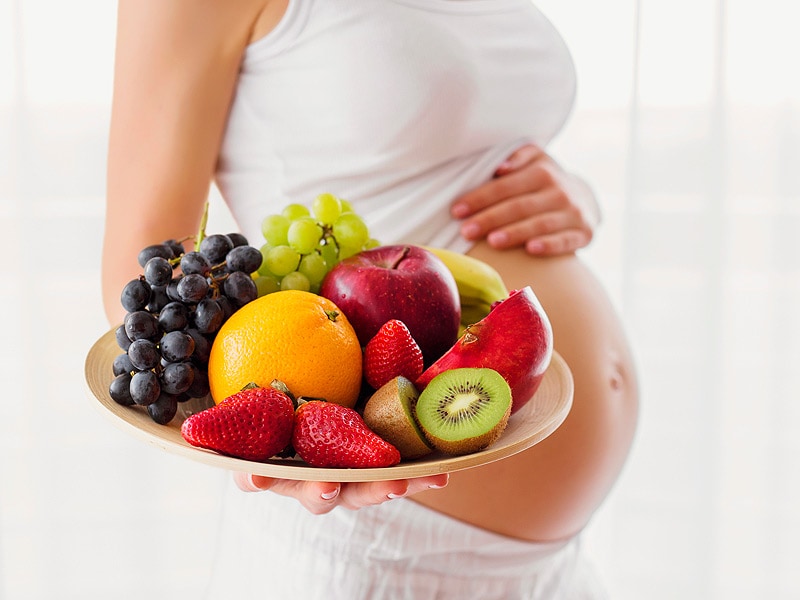
There’s a whole world of delicious options that give you and your baby everything you’ll need. Keep your healthcare team informed of your eating choices and let them guide you on a plan with any necessary supplements.
This list should be a good start towards a healthy, well-nourished pregnancy.
Quick tips for foods to eat when pregnant
- Dairy products, especially yogurt, are a great choice. They help you meet increased protein and calcium needs.
- Legumes are super sources of folate, fiber, and many other nutrients. Folate is a very important nutrient during pregnancy.
- Sweet potatoes are an excellent source of beta carotene, which your body transforms into vitamin A. Vitamin A is important for the growth and differentiation of cells in your growing baby.
- Salmon contains the essential omega-3 fatty acids EPA and DHA, which are important for brain and eye development in your growing baby. It’s also a natural source of vitamin D.
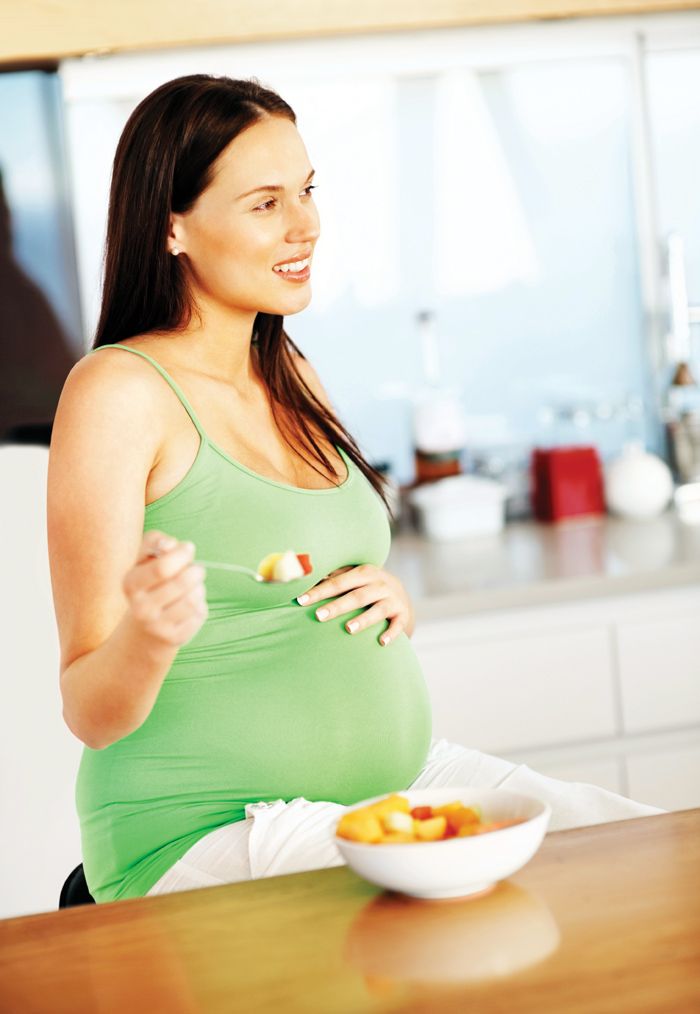
- Whole eggs are incredibly nutritious and a great way to increase your overall nutrient intake. They also contain choline, an essential nutrient for brain health and development.
- Broccoli and leafy greens contain most of the nutrients that you’ll need. They’re also rich in fiber, which may help prevent or treat constipation.
- Lean meat is a good source of high-quality protein. Beef and pork are also rich in iron, choline, and B vitamins, all of which are important nutrients during pregnancy.
- Berries contain water, carbs, vitamin C, fiber, vitamins, antioxidants, and plant compounds. They may help you increase your nutrient and water intake.
- Whole grains are packed with fiber, vitamins, and plant compounds. They’re also rich in B vitamins, fiber, and magnesium.
- Avocados contain high amounts of monounsaturated fatty acids, fiber, folate, and potassium. They may help relieve leg cramps, too.
- Dried fruit may be highly beneficial for pregnant women since they’re small and nutrient-dense.
Just make sure to limit your portions and avoid candied varieties, to prevent excess sugar intake.
- Drinking water is important as your blood volume increases during pregnancy. Adequate hydration may also help prevent constipation and urinary tract infections.
Healthy nutrition during pregnancy
Category: Healthy food.
Happiness, agonizing expectation, anticipation and even fear - all these feelings inevitably accompany pregnant women. And it is very important during this period not to surrender to emotions, but to remember the responsibility that is an integral part of this time. It is during this period that it is important to follow the basics of a healthy lifestyle, taking into account the requirements of pregnancy. Proper nutrition during pregnancy is the most relevant, since what a woman eats largely determines how her child will develop. For example, whether a pregnant woman receives enough protein depends on whether the child will have enough building material.
It makes sense to take into account one important feature: proper nutrition in early pregnancy will be somewhat different from the diet of a pregnant woman in the last weeks.
Not everyone understands where such differences come from, but understanding the topic will be quite simple. Judge for yourself, important systems of the body are laid in the early stages, but the size of the fetus increases slightly. Therefore, in the early stages, a healthy diet for pregnant women is based on sufficient intake of minerals, vitamins, and the like.
In the second trimester of pregnancy, nutrition should focus on increased protein intake, since it is now that the active growth of the child and its internal organs begins. All this requires a building material, that is, protein.
Nutrition in the third trimester of pregnancy is, first of all, vitamins and minerals that are necessary for the development of the internal systems of the child's body, especially calcium for bone growth and the development of the nervous system.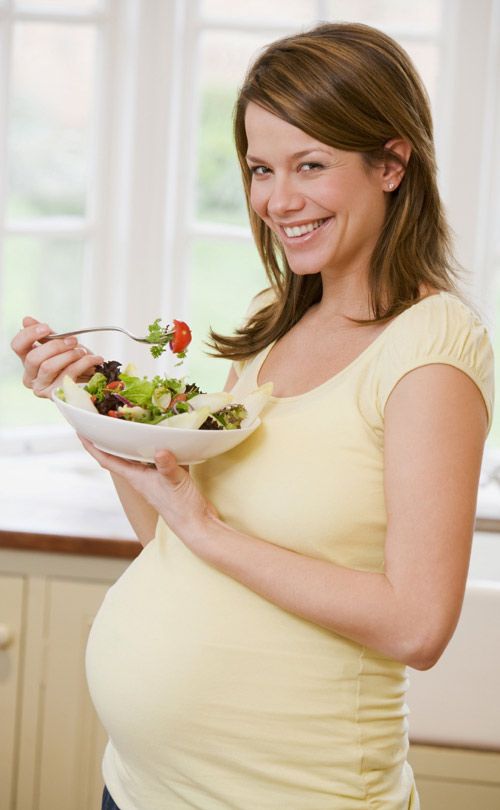
When planning a pregnancy, proper nutrition is also very important. The more healthy, hardy, strong the woman's body is at the time of conception, the greater the chances of successfully fixing the fetal egg in the uterus. And a certain set of vitamins in the body contributes to the proper development of the embryo.
As you can see, the difference in recommendations for proper nutrition of pregnant women by months, and sometimes even by weeks, is quite justified. However, there are, of course, general rules for proper nutrition during pregnancy, which will be discussed further.
General principles of proper nutrition during pregnancy
First of all, it is worth remembering one simple thing: it is better to get up from the table slightly hungry than with heaviness in the stomach from overeating. In this regard, it is better to adhere to the principles of fractional nutrition at all: eat less, but more often. The ideal option would be to eat 5-6 times a day. The last meal should be 3 hours before bedtime. If the feeling of hunger is unbearable, you can drink a glass of milk or yogurt, eat an apple or a pear. It is this diet for pregnant women that will be most optimal.
The ideal option would be to eat 5-6 times a day. The last meal should be 3 hours before bedtime. If the feeling of hunger is unbearable, you can drink a glass of milk or yogurt, eat an apple or a pear. It is this diet for pregnant women that will be most optimal.
Proper nutrition during pregnancy, like, in fact, any proper nutrition, involves the exclusion or maximum restriction of fried foods, pickled foods and smoked meats. Steamed, boiled, stewed or baked food will be much more useful. Food for pregnant women should be as fresh and natural as possible, should not contain preservatives, excess salt, and the like.
Obviously, canned foods, various sausages and other long-term storage products, if not banned, then require strict control of their use.
Of course, it is recommended to give up fast food. However, it is worth noting that if the choice arises - to remain hungry or eat something not very healthy, it is better to choose the latter. A pregnant woman should not starve.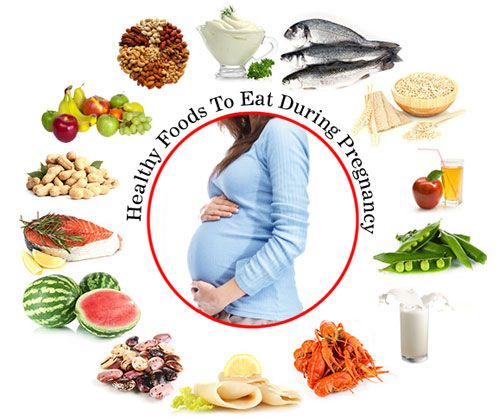 Another thing is, if you get suspiciously often before such a choice, then you should think about carrying fruits or sandwiches with you.
Another thing is, if you get suspiciously often before such a choice, then you should think about carrying fruits or sandwiches with you.
Of great importance is the balance between such important components of nutrition as proteins, fats, carbohydrates, as well as vitamins and minerals. Of course, a balanced diet for pregnant women at different times implies a different balance of these components, the fact itself remains unchanged.
Weekly meals
1-3 weeks pregnant
Gynecologists count pregnancy not from the day of conception, since it is almost impossible to calculate it, but from the first day of the last menstruation. Therefore, the first 2 weeks of the obstetric gestation period falls on the time before conception.
Pregnancy planning is an extremely important period, on which, whatever one may say, both the health of the unborn child and the absence of any complications during pregnancy depend.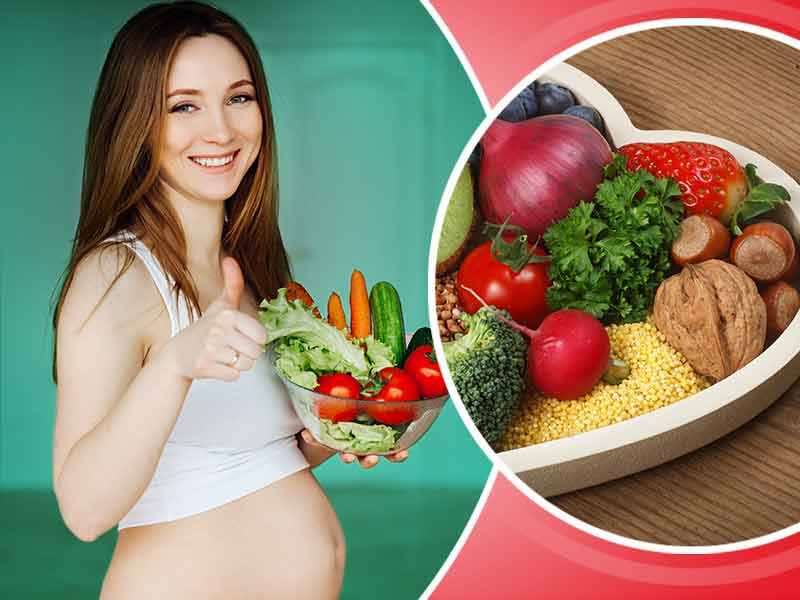 So it turns out that proper nutrition before pregnancy is of paramount importance. At this stage, it is very important to increase the amount of folic acid. Doctors often recommend drinking it in the form of capsules, but it is much better to get all the vitamins from normal food. Folic acid is found in green leafy vegetables (spinach, lettuce, cabbage, etc.), asparagus, beans and legumes, seeds and nuts, citrus fruits.
So it turns out that proper nutrition before pregnancy is of paramount importance. At this stage, it is very important to increase the amount of folic acid. Doctors often recommend drinking it in the form of capsules, but it is much better to get all the vitamins from normal food. Folic acid is found in green leafy vegetables (spinach, lettuce, cabbage, etc.), asparagus, beans and legumes, seeds and nuts, citrus fruits.
It is equally useful to consume yellow fruits and vegetables. But it is better to refuse fatty and sweet foods. This will avoid problems with obesity, as well as reduce the risk of early toxicosis.
Approximately on the 10-14th day of the cycle, fertilization occurs and the movement of the fetal egg begins towards the uterus. From this time on, we can talk about the onset of pregnancy.
3rd week
Nutrition at the beginning of pregnancy is a very complicated topic, since literally every week new organs and systems appear in the fetus, which means that the need for vitamins and nutrients is constantly changing.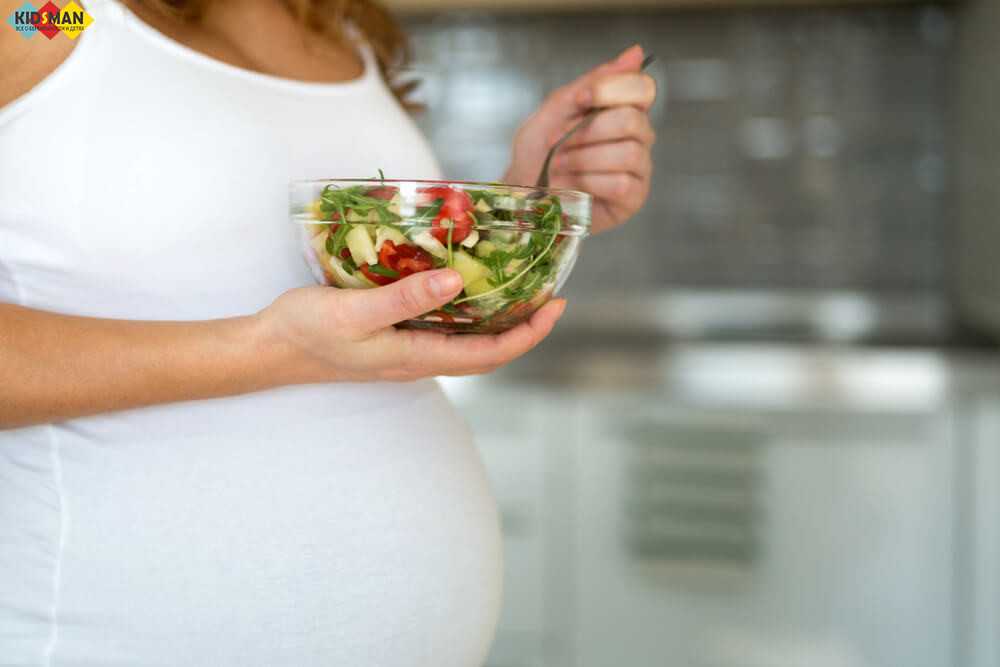
In the third week of pregnancy, the egg is implanted and the placenta begins to develop, as well as the fetal membrane. For their full development, calcium is needed, which is found in dairy products, nuts, fish, legumes, fruit juices and cereals; and manganese, it can be obtained from nuts, spinach, beets, mushrooms, animal liver.
4 week
For 4 weeks, the nutrition remains the same as for 3, but at this time it is especially important to give up coffee. However, drinking this certainly tasty, but not very healthy drink during pregnancy should be done with extreme caution. Especially coffee is contraindicated in the evening. As you can see, proper nutrition in the first month of pregnancy is not too difficult. Further it will be a little more difficult.
5 week
As a rule, toxicosis of pregnant women begins around this time. To alleviate this condition, you can slightly change your daily menu.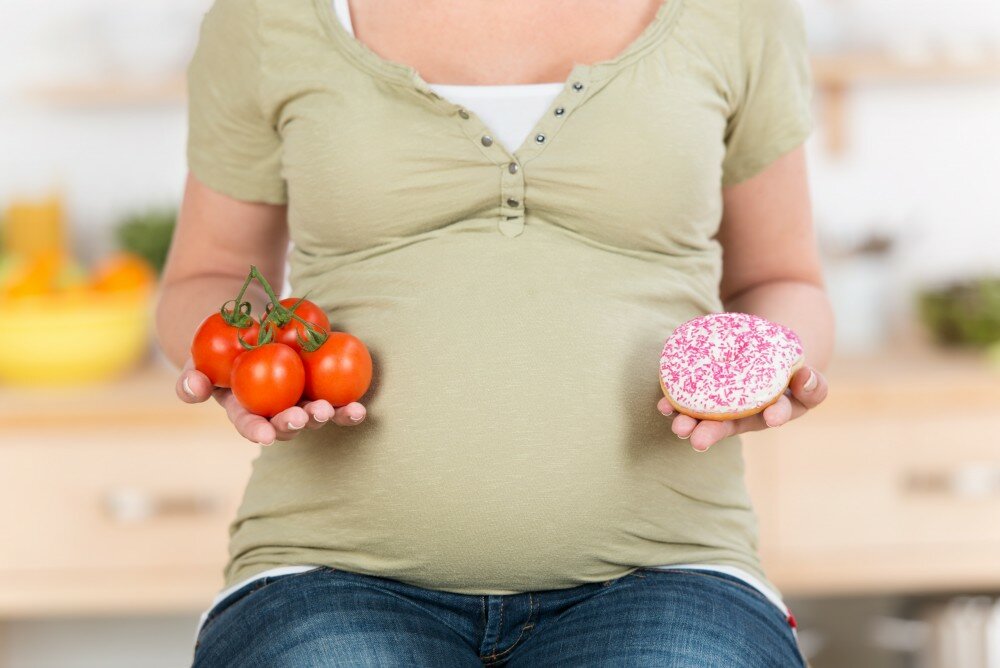 So, meat and eggs, as well as other animal proteins, can be replaced with nuts, soy and other legumes. Instead of milk, you can eat yogurt and cheese. It will not be superfluous to introduce carrots, mangoes, apricots into the diet.
So, meat and eggs, as well as other animal proteins, can be replaced with nuts, soy and other legumes. Instead of milk, you can eat yogurt and cheese. It will not be superfluous to introduce carrots, mangoes, apricots into the diet.
6 week
Toxicosis is in full swing, so the morning should start with crackers or unsweetened crackers. It is better to eat them immediately after waking up, without getting out of bed. At this stage, it is better to drink plenty of fluids, at least 8 glasses a day (for example: water with lemon juice or tea with lemon). At night, you can eat a handful of raisins.
7 week
At this time, problems with the intestines may arise. Therefore, you should avoid foods that promote gas formation, including cabbage. It will not be superfluous to refuse those products that strengthen. It is better to introduce prunes, fresh kefir and the like into the diet.
8 week
Ginger tea will help to cope with toxicosis, and do not forget about nuts.
9-10 weeks
Give preference to whole grain cereals and whole grain bread. Brown rice is better than white. In general, the body of a pregnant woman at this stage needs quite a lot of fiber.
11-12 weeks
The first trimester of pregnancy is coming to an end, and nutrition at this time should be special. This is the most difficult time, and it is very important to listen to yourself, to your body. If you want to eat a particular dish, then it is precisely those substances that are contained in it that your baby lacks. Of course, you shouldn't go to extremes.
13-16 weeks
Nutrition in the 2nd trimester during pregnancy is characterized, as already mentioned, by abundant protein intake. In addition, it is necessary to increase the total daily caloric intake of food. If in the first trimester it will be enough to eat 2400-2700 kcal, then from this time it is necessary to eat 2700-2900 kcal.
16-24 weeks
Nutrition at 6 months of pregnancy should contribute to the development of the child's vision and hearing. That is, you need vitamin A and beta-carotene. It is better to eat cabbage, yellow peppers, carrots at this time. Keep in mind that vitamin A is absorbed only with fats.
24-28 weeks
It is at this time that fractional nutrition becomes especially relevant. The uterus is actively growing, taking up more and more space in the abdominal cavity, and begins to put pressure on the stomach. Accordingly, the stomach becomes smaller, and it is difficult for it to contain a large amount of food. Even when eating small meals, a pregnant woman may be bothered by heartburn. It is better to give up carbonated drinks and coffee, they also provoke heartburn. In general, the nutrition of a pregnant woman in the third trimester should be as diverse as possible, as the needs of the baby grow.
29-34 weeks
At the 8th month, bones are actively growing and teeth are being laid, therefore, it is very important to eat as many calcium-containing foods as possible.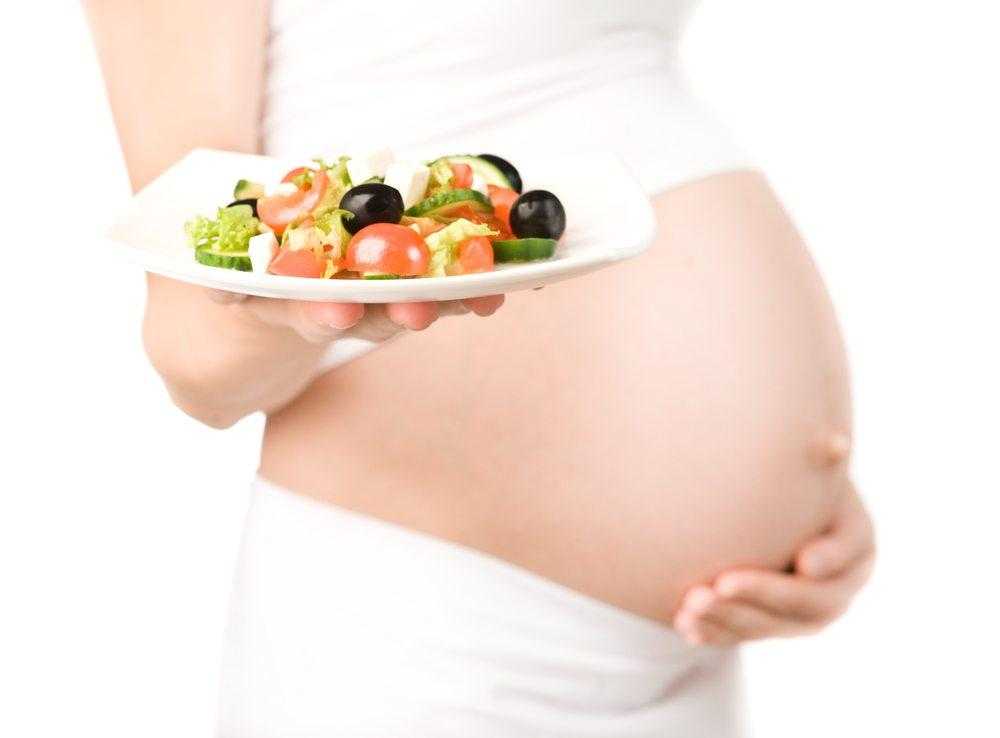 For brain development, fatty acids are simply necessary, and they contribute to the absorption of calcium. Iron deficiency at this time can lead to the development of anemia, both in the mother and in the child. Fatty fish, nuts, red meat, dark green vegetables and seeds are the foods to eat during this period of pregnancy.
For brain development, fatty acids are simply necessary, and they contribute to the absorption of calcium. Iron deficiency at this time can lead to the development of anemia, both in the mother and in the child. Fatty fish, nuts, red meat, dark green vegetables and seeds are the foods to eat during this period of pregnancy.
35-40 weeks
Nutrition at the 9th, last month of pregnancy, should contribute to the overall strengthening of the mother's body. After all, she has a very difficult and time-consuming job ahead of her - childbirth. The main source of energy in the body is carbohydrates, and it is their consumption that should become the basis of the nutrition of a pregnant woman before childbirth. Cereals and vegetables are the foods that you should eat during this period.
That's all that can be said about trimester nutrition. An example of a menu for pregnant women by trimesters may also be useful. Based on these menus and explanations for them, you can create a menu for yourself.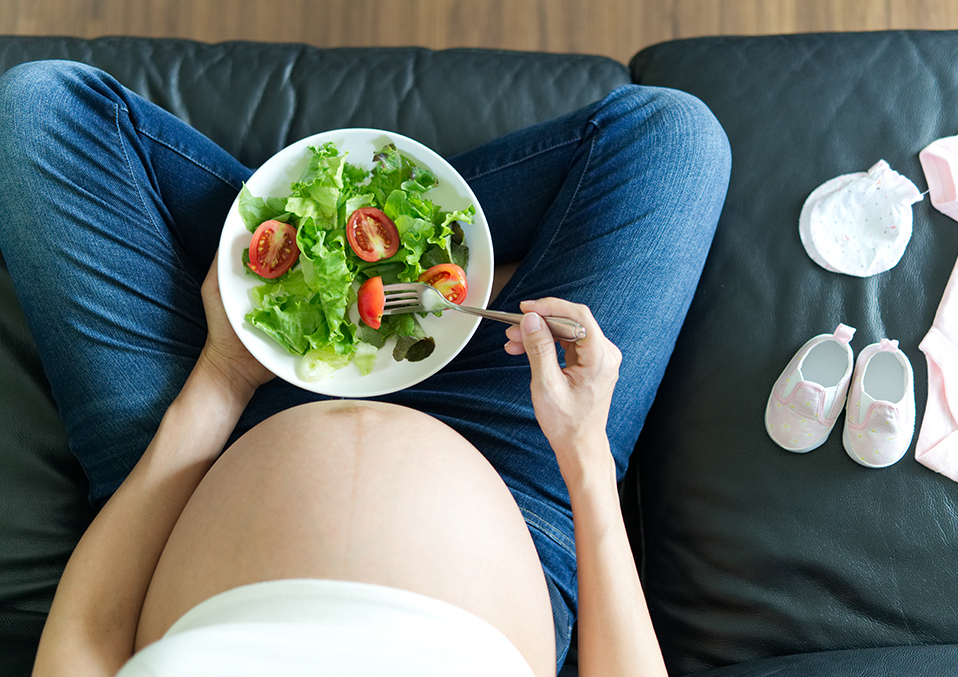
Sample menu for pregnant women for the 1st trimester
1. Breakfast: muesli with yogurt and freshly squeezed pear juice.
2. First snack: salmon sandwich.
3. Lunch: mushroom soup, cabbage salad, herbal tea.
4. Second snack: whole grain bread with cheese.
5. Dinner: carrot salad and vegetable risotto. You can drink everything with kefir.
In the first trimester, it is very important that a woman receives a large amount of folate and vitamin B6 from food.
An example of a menu for pregnant women for the 2nd trimester
In the second trimester for pregnant women, the presence of omega-3 acid, calcium, vitamin D and iron in the diet is important.
1. Breakfast: oatmeal in milk with apple and cinnamon, chamomile tea.
2. First snack: almonds with prunes.
3. Lunch: lentil soup, seaweed salad, cranberry juice.
4. Second snack: sandwich with herring.
5. Dinner: omelet with mushrooms and yogurt.
An example of a menu for pregnant women for the 3rd trimester
Carbohydrates and vitamin K play a special role here.
1. Breakfast: pancakes with cream cheese and curdled milk.
2. First snack: whole grain cheese sandwich.
3. Lunch: fish hodgepodge, tuna and green salad, rosehip broth.
4. Second snack: cheesecake.
5. Dinner: fish with rice and fermented baked milk.
Special nutrition for pregnant women
But this is not all the nutritional features of pregnant women. In some cases, women develop pathologies during pregnancy that require special nutrition. So, with anemia in pregnant women, special nutrition is simply necessary. A woman who has experienced pregnancy anemia should consult a doctor not only about drug treatment, but also about an appropriate diet. With such a disease, it is very important to increase the intake of foods containing iron.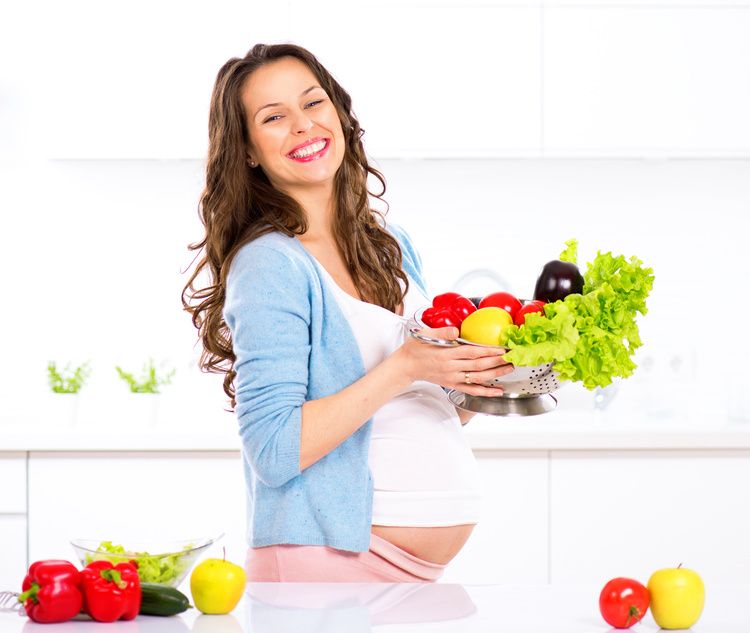 Iron can be obtained from animal products (lean red meat, fish, poultry) and vegetable (nuts, dried porcini mushrooms, spinach, buckwheat, legumes, etc.) origin. In addition, it is important not only to know which foods to use, but also in what combinations, as this affects the absorption of iron in the human body. Vitamin C increases the absorption of iron in the body, that is, the combination of products containing iron and vitamin C is favorable. Foods containing calcium (dairy products) and tannin (tea, coffee) prevent the absorption of iron in the intestine. Therefore, their use should be separated.
Iron can be obtained from animal products (lean red meat, fish, poultry) and vegetable (nuts, dried porcini mushrooms, spinach, buckwheat, legumes, etc.) origin. In addition, it is important not only to know which foods to use, but also in what combinations, as this affects the absorption of iron in the human body. Vitamin C increases the absorption of iron in the body, that is, the combination of products containing iron and vitamin C is favorable. Foods containing calcium (dairy products) and tannin (tea, coffee) prevent the absorption of iron in the intestine. Therefore, their use should be separated.
With obesity that has developed during pregnancy, there may be a need for dietary nutrition for pregnant women. It is important to remember that without consulting a doctor, a pregnant woman should not choose a diet for weight loss. The risk of developing pathologies and abnormalities is too great, both in the body of the mother and in the body of the child.
Especially harmful are mono-diets and diets that require prolonged fasting. Both contribute to malnutrition and vitamin deficiency. It will take a very long time to restore the state of the body, the supply of nutrients and vitamins, and it is completely impossible to compensate for the harm that such diets cause to a child.
Both contribute to malnutrition and vitamin deficiency. It will take a very long time to restore the state of the body, the supply of nutrients and vitamins, and it is completely impossible to compensate for the harm that such diets cause to a child.
Nutrition during pregnancy - Geburtsinfo Wien
Many people think that pregnant women should eat "for two", that is, twice as much as usual. But it's not!
It is much more important to organize a healthy diet with plenty of fresh vegetables and fruits, fish, milk, dairy products and high quality fats. Drink plenty of fluids, preferably water or unsweetened tea. Don't diet or fast, even for religious reasons. Diets and fasting are harmful to pregnant women.
Essential for healthy development of the child:
- folic acid: in spinach, broccoli, egg yolk, tomatoes and bananas
- Iron: in meat, black pepper, cinnamon, parsley, beans, peas, lentils, sesame seeds, poppy seeds, nuts
- Iodine: use iodized table salt!
- Calcium: in milk, dairy products, cabbage, broccoli, leeks, dill
Discuss all questions with your doctor and read the following information:
Dangerous and illegal foods for pregnant women
During pregnancy, the entire female body changes.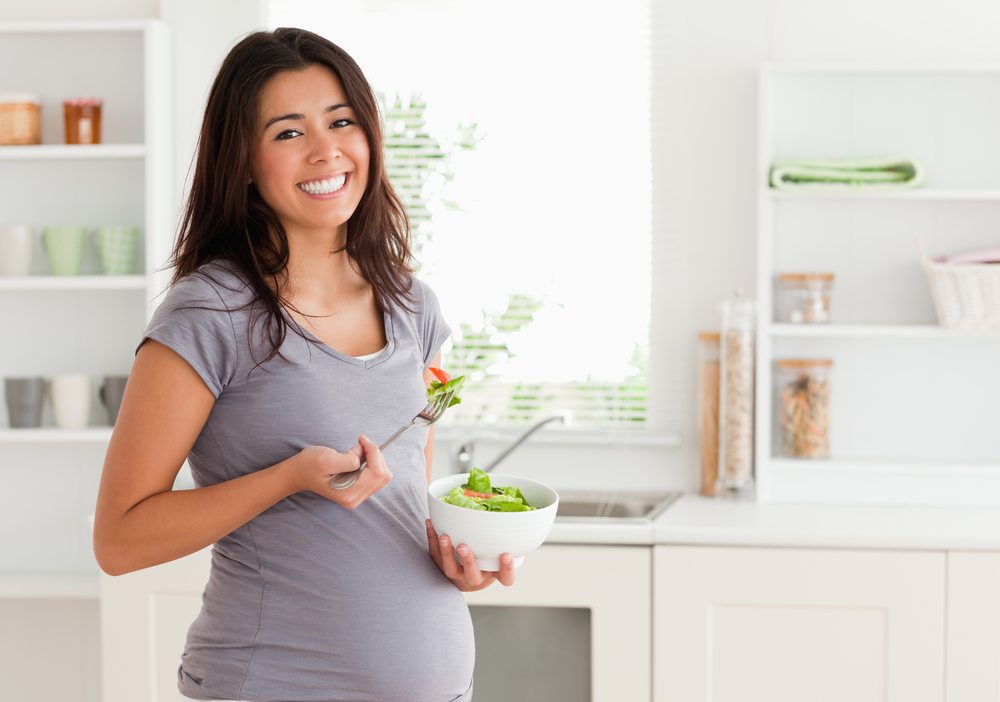 This can weaken the immune system, lowering the body's defenses. Therefore, at this time, infectious diseases are more severe than usual, which can jeopardize the health of the mother and unborn child.
This can weaken the immune system, lowering the body's defenses. Therefore, at this time, infectious diseases are more severe than usual, which can jeopardize the health of the mother and unborn child.
Take precautions: When preparing and eating food, pay attention to the following two things:
- Practice strict hygiene when preparing and storing food.
- Avoid so-called dangerous foods.
Dangerous foods include:
- raw milk and raw milk products
Discard raw milk or boil it first.
Avoid raw milk products. You will recognize these products by their "Made with Raw Milk" label.
Remove the skin from the cheese and do not eat cheeses that ripen in the presence of slime microflora (eg tilsiter, quargel) and soft cheeses (eg camembert).
- Meat, fish and eggs
WARNING! Avoid oily predatory fish such as tuna, swordfish, halibut and pike. These fish often contain heavy metals.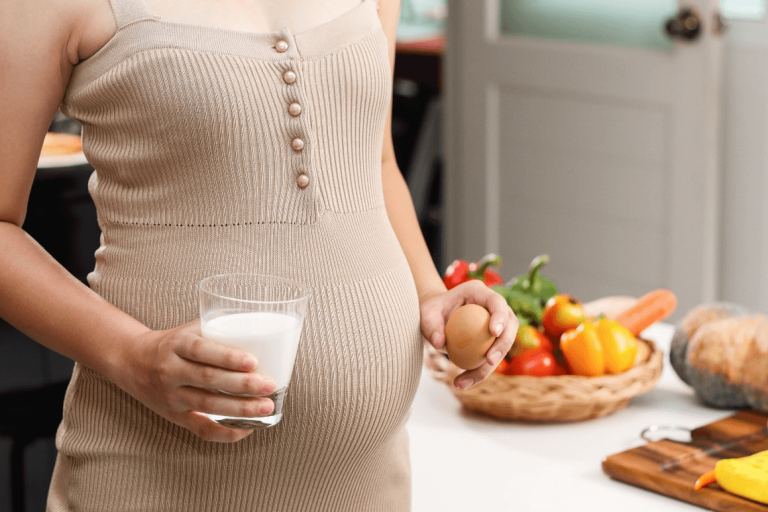
Heavy metals are also found in giblets. Therefore, you will have to give up offal.
Avoid raw and undercooked fish and seafood, including sushi, oysters, and the like.
Avoid smoked and pickled fish, including smoked salmon, and gravaviloha.
Do not eat raw or undercooked eggs, meat or sausages. This list includes carpaccio, beef tartare, low to medium rare steak, salami, smoked sausage, hunting sausages, smoked ham, smoked meat, ham fat, soft-boiled eggs, fried eggs or raw egg dishes, including homemade tiramisu and the like.
- Drinks
Avoid alcohol and smoking. So far, no scientific study has been able to prove that alcohol, even in small doses, is not dangerous for pregnant women. Therefore: hands off alcohol! Be aware that flour products, sweets or cooked sauces may contain (residual) alcohol!
Don't take unnecessary risks and keep caffeinated drinks to a minimum. No more than 2-3 cups of coffee or 4 cups of green or black tea are allowed.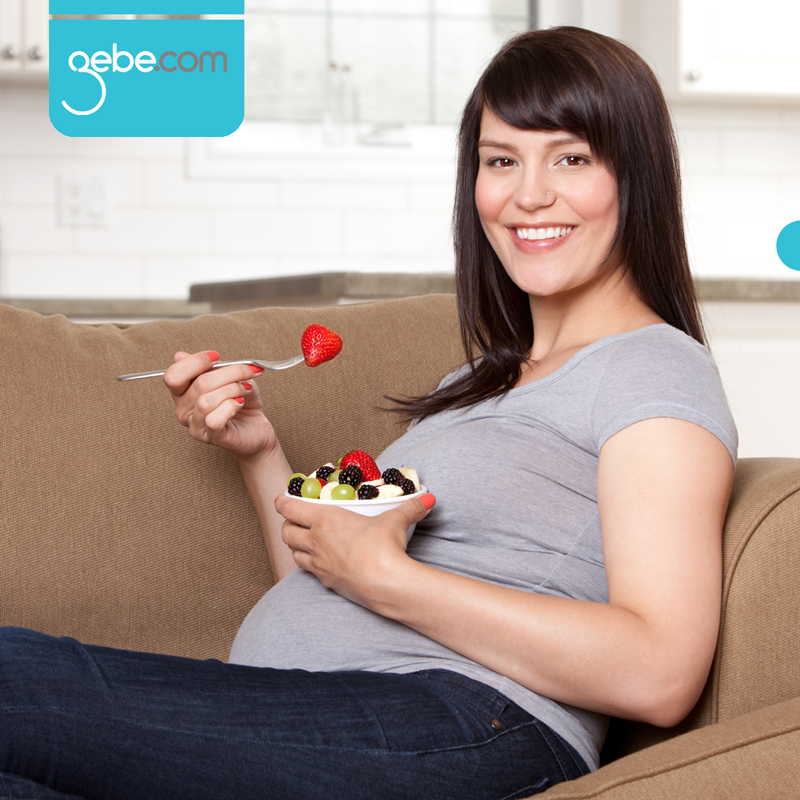 Attention: Cold tea and coffee drinks, coca-cola, guarana drinks, many energy drinks and the like contain caffeine!
Attention: Cold tea and coffee drinks, coca-cola, guarana drinks, many energy drinks and the like contain caffeine!
As a precaution, do not consume freshly squeezed and uncooked fruit and vegetable juices sold in stalls and shops.
Do not drink beverages containing quinine, such as gin and tonic, Bitter Lemon, etc.
Talk to your doctor and read the following information:
Addictive Substances
Quit All Alcohol, Tobacco and Drugs During Pregnancy!
Alcohol
Do not drink alcohol during pregnancy! Even in small doses, alcohol can cause serious harm to a child. Alcohol acts like a poison on the nerves and brain, being one of the most common causes of anomalies in the development of the child.
Talk to your doctor and read the following information:
Smoking
Stop smoking during pregnancy and avoid smoky rooms! Cigarettes contain nicotine and nearly 5,000 other chemicals.



